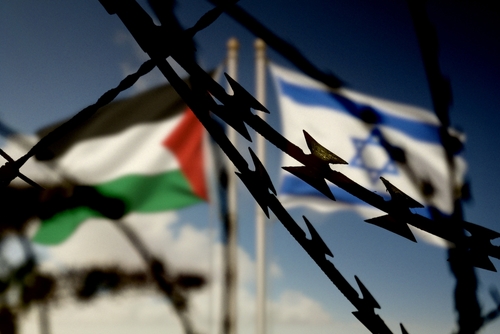Rutgers University recently faced a disruption during its new student orientation when anti-Israel activists interrupted a scripted exercise aimed at teaching freshmen how to handle disagreements respectfully. The incident, which occurred earlier this month, involved members of a group called Build Up Resistance Now (BURN), who hijacked the event with chants and banners condemning the university’s perceived involvement in international conflicts, particularly in Gaza.
The orientation exercise was designed to foster dialogue on sensitive topics by encouraging students to understand their rights to protest and free speech on campus. However, BURN's actions turned what was meant to be a learning experience into a chaotic scene. The group’s press release stated, “We don’t want to have a debate about whether or not Rutgers should be involved in dropping bombs on the Gaza Strip. We want it to stop completely,” signaling their refusal to engage in any form of compromise.
Students at Rutgers University continue their protests, demanding an end to the Israeli genocidal war on Gaza pic.twitter.com/1JkUEb98vm
— Palestine Highlights (@PalHighlight) May 11, 2024
After the event, BURN members took to social media to boast about their success in canceling the orientation exercise, declaring “VICTORY! MOCK PROTEST SKIT CANCELED!” on their Instagram page.
The activists also mocked the university's "time, place, and manner" policy, questioning why Rutgers enforces restrictions on protests that are effective in achieving their goals.
Students at #Rutgers University continue their protests, demanding an end to the Israeli genocidal war on #Gaza #Palestine #US pic.twitter.com/yK47CO9o9w
— ⚡️🌎 World News 🌐⚡️ (@ferozwala) May 11, 2024
The disruption has sparked significant controversy, particularly among Jewish students and faculty at Rutgers. Many have expressed concern over what they see as a growing trend of antisemitism on campus, exacerbated by the university administration's handling of such protests. More than 150 Jewish students and over 200 faculty members signed open letters condemning the administration’s failure to enforce campus rules, which they argue has allowed for an environment of intimidation and hostility.
The incident at Rutgers is part of a larger wave of protests across various campuses in the United States, where anti-Israel sentiments have been on the rise. The BURN group is not officially recognized by Rutgers, and it remains unclear if all participants were university students. Despite this, their actions have ignited a broader debate about the limits of free speech and the role of universities in managing such conflicts.
In response to the incident, Rutgers officials sent an email acknowledging the disruption and reiterating the university's policies on appropriate demonstrations. The email noted that the activists violated campus guidelines and that an investigation is underway to determine the appropriate course of action. However, BURN’s press release dismissed these policies as “oppressive” and vowed to continue their activism on campus.
This event highlights the ongoing tension at Rutgers and other universities, where ideological clashes over the Israel-Palestine conflict are becoming increasingly common. With activists prioritizing disruption over dialogue, concerns about the suppression of free speech and the impact on campus life continue to grow.




